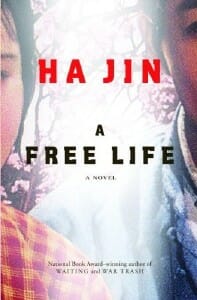Ha Jin

Cultural Relativity
Revered Chinese writer explores the writer’s inner life
Jin Xuefei—Ha Jin to readers of his seven previous works of ?ction and three books of poetry—must certainly by now be part of the annual pistol duels at the Swedish Academy. That’s where the good gentlemen and ladies of Stockholm fight to decide winners of the Nobel Prize for Literature.
A 51-year-old native of Liaoning, People’s Republic of China, Ha Jin was formerly a teacher at Emory University and is now at Boston University. He enjoys a unique vantage point as we round the fast curve into the 21st century, standing with one leg in China and one leg in America, painting the view from up there in careful, deliberate, calligraphic brushstrokes. The dabs conjure canvases of impossibly exotic places—Chinese landscapes and communities like his ?ctional Muji City that somehow exist in our minds, as much make-believe as real.
Even Ha Jin’s own story seems fiction. Born in China as the son of a military officer, the writer-to-be served in the People’s Liberation Army before taking up university life, earning a bachelor’s degree in English and a master’s in Anglo-American Studies, these in mainland China.
Chasing a Ph.D., he traveled abroad on a scholarship to Brandeis University, but when the Chinese government crushed the incipient democracy movement in Tiananmen Square in 1989, Ha Jin expatriated. Like two other literary masters, Joseph Conrad and Vladimir Nabokov, he left off publishing in his native language, choosing English for his first volume of poetry, Between Silences, and then for all of the subsequent works, which have been critically hailed (the measured and mesmerizing Waiting won a National Book Award in 1999).
-

-

-

-

-

-

-

-

-

-

-

-

-

-

-

-

-

-

-

-

-

-

-

-

-

-

-

-

-

-

-

-

-

-

-

-

-

-

-

-








































